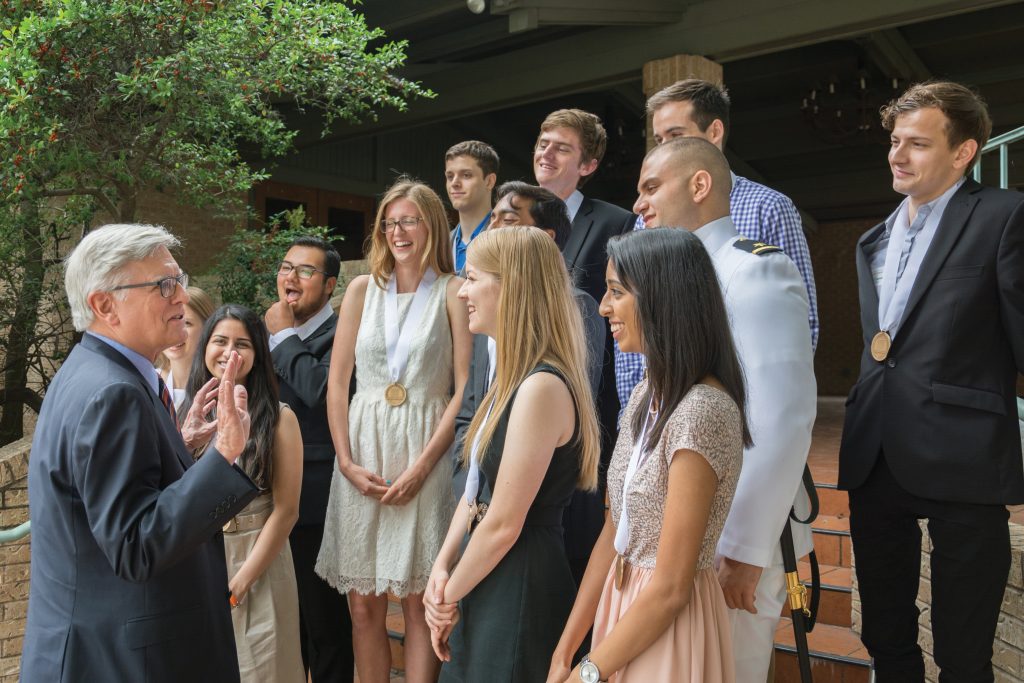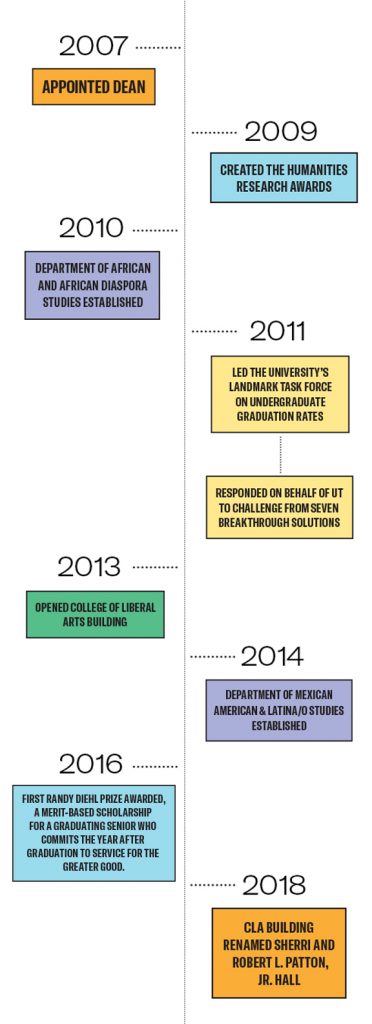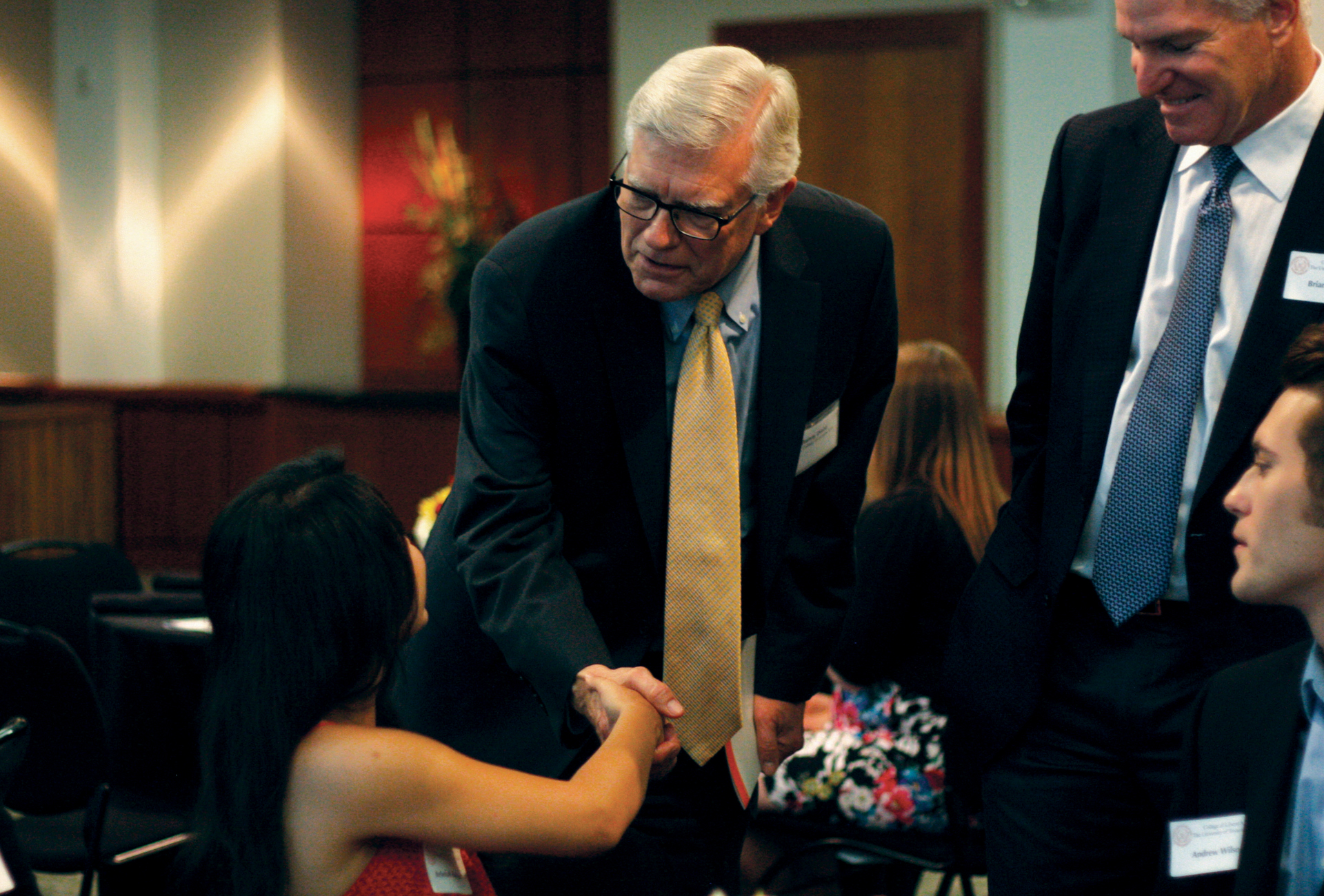Randy Diehl is a morning person. Rising at 4 a.m., he writes a few emails catches up on his reading and takes a brisk walk before heading to campus to lead a college with 22 academic departments, three branches of the ROTC and more than 500 faculty members. Despite long days and a demanding schedule, he never seems to tire. That’s because he is on a mission.
“At the risk of appearing grandiose, I believe that what we do at UT and at other Tier One research universities is of civilizational importance,” he says. “The founders of our American universities believed that the liberal arts were vital to a democracy, which rests on the shoulders of educated citizens and leaders who know the meaning of liberty and know how to exercise it wisely.”
“The founders of our American universities believed that the liberal arts were vital to a democracy, which rests on the shoulders of educated citizens and leaders who know the meaning of liberty and know how to exercise it wisely.”
Randy Diehl
As a professor, researcher and department chair of psychology, Diehl worked side by side with dozens of undergraduate and graduate students, exploring the mysteries of how people perceive and produce speech. His students would learn how to solve complex problems and develop critical thinking skills, but he also hoped they would develop an unquenchable desire to keep on learning and apply what they learned to making the world a better place.
Whether they knew it or not, that was the outcome Diehl sought for every one of the tens of thousands of students who passed through the college since he became dean in 2007. Regardless of their chosen field of study, he hoped each would graduate equipped for a lifetime of learning and service to others.
Born in Freeport, Illinois, Diehl is something of a polymath in his approach to learning, a voracious reader with a particular bent toward histories. He plows through massive tomes like Neil Kamil’s Fortress of the Soul — more than a thousand pages on the life and culture of 18th century French Huguenot settlers — his eyes light up as he describes the sheer pleasure of reading such a dense and well-researched book. He has read an enormous amount of fiction as well, tracing the development of the novel from Swift to Proust to Hemingway. (He’s currently finishing Dostoevsky’s The Brothers Karamazov, puzzled that he somehow missed that one along the way.) But Diehl also loves reading about the hard sciences, especially about advances in astrophysics. In sum, he has a curious mind that has suited him well as dean of a college that spans so many disciplines in the humanities, social sciences and languages.
It is a job Diehl would have found unlikely when he joined the UT faculty in 1975. “If someone had predicted that I would one day become a dean, I would have loudly scoffed at the idea,” he says. “What changed my mind? In 1995 I reluctantly agreed to serve as chair of the psychology department, and within a matter of weeks I came to understand that academic leadership can be among the most gratifying experiences a faculty member can have.”
Diehl says what he came to appreciate — and then to love — was the opportunity to work with colleagues to advance scholarly, educational and service missions.

It is this mission-driven focus that has helped Diehl remain both resilient and optimistic during his two terms as dean. Barely a year into his deanship, the Great Recession of 2008 sent a shockwave through the U.S. economy that severely curtailed resources allotted to higher education.
“We managed to continue to recruit and retain outstanding faculty despite serious budgetary limits,” says Diehl, who credits the innovative leadership in his college as well as the unwavering support of alumni and donors for helping him continue to build excellence in the college.
“One of the joys of being a dean is reading the scholarly and educational work of faculty being considered for promotion in rank (he has personally reviewed 363 cases as dean), and there is simply no question that the quality of our faculty has improved year after year,” he says. “The percentage of successful promotion cases has continued to rise even as our standards have become ever more rigorous.”
A critical part of building an excellent faculty is recruiting and retaining a diverse faculty, and Diehl says he believes the college has made good on that commitment.
During his terms as dean, two new departments were added, the Department of African and African Diaspora Studies and the Department of Mexican American and Latina/o Studies; and first steps were taken to make the Center for Women’s and Gender Studies, which launched a program in LGBTQ Studies, a full-fledged department.
“Some of the most ambitious and groundbreaking scholarship at UT is taking place in these very units,” Diehl says.

Another persistent challenge has been the shortage of high-quality space to perform the college’s research and teaching missions. Diehl began to address this challenge when he was chair of the Department of Psychology, leading the effort to build a new home for the department — the Sarah M. and Charles E. Seay Building. Work is now underway for an addition to that building that will bring the groundbreaking research of the Center for Perceptual Systems and the Institute for Mental Health Research together under one roof.
During Diehl’s time as dean, the college has seen the renovation and expansion of many spaces, most notably the Gordon-White Building — which formerly housed the Department of Geography and the Environment — and is now home to Black Studies and Latino Studies.
The most significant construction project of all was a new College of Liberal Arts building that opened in 2013 and was renamed the Sherri and Robert L. Patton, Jr. Hall in 2018. Not only did it mark a transformational moment for the college — the first building on campus specifically dedicated to the liberal arts and its students — it also marked the first time a college at UT had financed its own building.
“When plans for what became Patton Hall were first being discussed, we were told that none of the usual funding sources for capital projects would be available. So, we decided to underwrite the project with existing college funds,” Diehl says. “This had never been done before, but we were able to pull it off with the help of generous donors. We also managed to complete the project $15 million under the original cost estimate, with 14 percent more assignable space than earlier planned — all while adhering to the highest standards of quality and sustainability.”
However, the college’s greatest accomplishment during the past 12 years, in Diehl’s estimation, is not about the buildings, but rather about defending the scholarship that takes place within their walls.“When the mission and values of UT Austin were under attack by certain members of the Board of Regents and others, the leadership of the college joined President [Bill] Powers and members of the Texas Coalition for Excellence in Higher Education in fighting back with arguments and evidence,” Diehl recalls. “We were successful, in particular, in refuting the claims of the so-called Seven Breakthrough Solutions, which, if implemented, would have destroyed UT Austin’s status as a Tier One research university.”
It wasn’t the first time college leadership was tapped by the university to lead a campus-wide initiative. In 2011, Diehl headed a task force to improve four-year graduation rates, prompting a number of major structural and policy changes that improved four-year graduation rates from 52 to 70 percent in a five-year period. Under Diehl’s leadership, the college also led the university in such areas as student advising, the development of online classes and the consolidation of business services.
Although he officially retires at the end of August, Diehl will doubtless continue to rise at 4 a.m. That is what happens when you are mission-driven and a creature of the liberal arts. The desire to learn, discover and to serve never ends. As Diehl used to tell graduates at the May commencement ceremony, “the liberal arts will give you a life that is richly lived with curiosity, passion and purpose. It will always keep you connected to the wonders of this world.”
